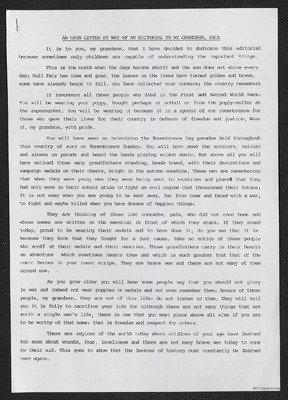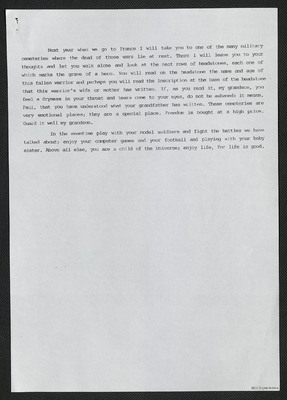An Open Letter by Way of an Editorial to my Grandson, Paul
Title
An Open Letter by Way of an Editorial to my Grandson, Paul
Description
A letter explaining Remembrance and why it is important to his generation.
Creator
Coverage
Language
Type
Format
Two printed sheets
Publisher
Rights
This content is available under a CC BY-NC 4.0 International license (Creative Commons Attribution-NonCommercial 4.0). It has been published ‘as is’ and may contain inaccuracies or culturally inappropriate references that do not necessarily reflect the official policy or position of the University of Lincoln or the International Bomber Command Centre. For more information, visit https://creativecommons.org/licenses/by-nc/4.0/ and https://ibccdigitalarchive.lincoln.ac.uk/omeka/legal.
Contributor
Identifier
MRidingRH1525125-210923-180001, MRidingRH1525125-210923-180002
Transcription
[underlined] AN OPEN LETTER BY WAY OF AN EDITORIAL TO MY GRANDSON, PAUL [/underlined]
It is to you, my grandson, that I have decided to dedicate this editorial because sometimes only children are capable of understanding the important things.
This is the month when the days become shortr [sic] and the sun does not shine every day; Hull Fair has come and gone, the leaves on the trees have turned golden and brown, some have already begun to fall. you have collected conkers; the country remembers
It remembers all those people who died in the First and Second World Wars. You will be wearing your poppy, bought perhaps at school or from the poppy-seller at the supermarket. You will be wearing it because it is a symbol of our remembrance for those who gave their lives for their country in defence of freedom and justice. Wear it, my grandson, with pride.
You will have seen on television the Remembrance Day parades held throughout this country of ours on Remembrance Sunday. You will have seen the soldiers, sailors and airmen on parade and heard the bands playing solemn music. But above all you will have noticed those many grandfathers standing, heads bowed, with their decorations and campaign medals on their chests, bright in the autumn sunshine. These men are remembering that when they were young men they were being sent to countries and places that they had only seen in their school atlas to fight an evil regime that threatened their future. It is not easy when you are young to be sent away, far from home and faced with a war, to fight and maybe killed when you have dreams of happier things.
They are thinking of those lost comrades, pals, who did not come home and whose names are written on the memorial in front of which they stand. If they stand today, proud to be wearing their medals and to have done it, do you see that it is because they know that they fought for a just cause. Take no notice of those people who scoff at their medals and their memories. Those grandfathers carry in their hearts an adventure which sometimes haunts them and which is much greater that [sic] that of the comic heroes in your comic strips. They are brave men and there are not many of them around now.
As you grow older you will hear some people say that you should not glory in war and indeed not wear poppies or medals and not even remember them. Beware of these people, my grandson, they are not of this life: do not listen to them. They will tell you it is folly to sacrifice your life for although there are not many things that are worth a single man's life, there is one that you must place above all else if you are to be worthy of that name: that is freedom and respect for others.
There are regions of the world today where children of your age have learned too soon about wounds, fear, loneliness and there are not many brave men today to come to their aid. This goes to show that the lessons of history must constantly be learned over again.
[page break]
Next year when we go to France I will take you to one of the many military cemeteries where the dead of those wars lie at rest. There I will leave you to your thoughts and let you walk alone and look at the neat rows of headstones, each one of which marks the grave of a hero. You will read on the headstone the name and age of this fallen warrior and perhaps you will read the inscription at the base of the headstone that this warrior's wife or mother has written. If, as you read it, my grandson, you feel a dryness in your throat and tears come to your eyes, do not be ashamed: it means, Paul, that you have understood what your grandfather has written. These cemeteries are very emotional places; they are a special place. Freedom is bought at a high price. Guard it well my grandson.
In the meantime play with your model soldiers and fight the battles we have talked about; enjoy your computer games and your football and playing with your baby sister. Above all else, you are a child of the Universe; enjoy life, for life is good.
It is to you, my grandson, that I have decided to dedicate this editorial because sometimes only children are capable of understanding the important things.
This is the month when the days become shortr [sic] and the sun does not shine every day; Hull Fair has come and gone, the leaves on the trees have turned golden and brown, some have already begun to fall. you have collected conkers; the country remembers
It remembers all those people who died in the First and Second World Wars. You will be wearing your poppy, bought perhaps at school or from the poppy-seller at the supermarket. You will be wearing it because it is a symbol of our remembrance for those who gave their lives for their country in defence of freedom and justice. Wear it, my grandson, with pride.
You will have seen on television the Remembrance Day parades held throughout this country of ours on Remembrance Sunday. You will have seen the soldiers, sailors and airmen on parade and heard the bands playing solemn music. But above all you will have noticed those many grandfathers standing, heads bowed, with their decorations and campaign medals on their chests, bright in the autumn sunshine. These men are remembering that when they were young men they were being sent to countries and places that they had only seen in their school atlas to fight an evil regime that threatened their future. It is not easy when you are young to be sent away, far from home and faced with a war, to fight and maybe killed when you have dreams of happier things.
They are thinking of those lost comrades, pals, who did not come home and whose names are written on the memorial in front of which they stand. If they stand today, proud to be wearing their medals and to have done it, do you see that it is because they know that they fought for a just cause. Take no notice of those people who scoff at their medals and their memories. Those grandfathers carry in their hearts an adventure which sometimes haunts them and which is much greater that [sic] that of the comic heroes in your comic strips. They are brave men and there are not many of them around now.
As you grow older you will hear some people say that you should not glory in war and indeed not wear poppies or medals and not even remember them. Beware of these people, my grandson, they are not of this life: do not listen to them. They will tell you it is folly to sacrifice your life for although there are not many things that are worth a single man's life, there is one that you must place above all else if you are to be worthy of that name: that is freedom and respect for others.
There are regions of the world today where children of your age have learned too soon about wounds, fear, loneliness and there are not many brave men today to come to their aid. This goes to show that the lessons of history must constantly be learned over again.
[page break]
Next year when we go to France I will take you to one of the many military cemeteries where the dead of those wars lie at rest. There I will leave you to your thoughts and let you walk alone and look at the neat rows of headstones, each one of which marks the grave of a hero. You will read on the headstone the name and age of this fallen warrior and perhaps you will read the inscription at the base of the headstone that this warrior's wife or mother has written. If, as you read it, my grandson, you feel a dryness in your throat and tears come to your eyes, do not be ashamed: it means, Paul, that you have understood what your grandfather has written. These cemeteries are very emotional places; they are a special place. Freedom is bought at a high price. Guard it well my grandson.
In the meantime play with your model soldiers and fight the battles we have talked about; enjoy your computer games and your football and playing with your baby sister. Above all else, you are a child of the Universe; enjoy life, for life is good.
Collection
Citation
Ron Riding, “An Open Letter by Way of an Editorial to my Grandson, Paul,” IBCC Digital Archive, accessed November 5, 2024, https://ibccdigitalarchive.lincoln.ac.uk/omeka/collections/document/37428.
Item Relations
This item has no relations.


